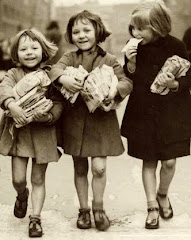I found Gene Luen Yang’s graphic novel American Born Chinese to be an extremely quick, insightful, and entertaining book to read. I love that he was able to capture so much of the Chinese American experience and relate it in a new way. Yang was able to take the story of a young boy as he matures to adolescents and, without taking away from the uniqueness of Jin Wang’s experience, is able to connect or relate it to the experience of the average American student who only wants to fit in. I thought Yang did a brilliant job of illustrating this point at the end of the book when all three stories come together. At first I was a bit confused by the three different stories going on within the book but when they came together I found myself going back and reading the novel again with a different frame of mind. Reading the book this second time, opened my eyes up to the different connections between the stories and allowed me to examine how they fit together even more.
At the beginning at the book, the Monkey King is ridiculed by the gods, goddesses, demons, and spirits. His attempt to fit in is a complete failure and it leaves him anguishing in self-consciousness. The next story, of Jin Wang, tells the old woman at the herbalist that he wants to be a Transformer when he grows up. She tells him to be careful what he wishes for because, “It’s easy to become anything you wish…so long as you’re willing to forfeit your soul” (29). This message stuck with me when I read the book through the first time; this message sets-up the entire story and offers a life lesson that all readers can take away from the book.
Okay, I have to comment on Chin-Kee—the epitome of negative Chinese stereotypes. I will admit that I found him to be part incredibly insensitive and offensive but also part hilarious. I think the extreme to which Yang made this character makes it hard not to laugh at to some degree. At the end, when the reader watches as Danny fights with Chin-Kee—who turns out to be the Monkey King and father of Danny/Jin’s former friend Wei-Chen—and the truth comes out, I found myself understanding Chin-Kee’s presence in the book as well as feeling a trifle sorry for my enjoyment in that character.
As a former high school student myself who tried to be somewhat invisible in school—to blend in enough that no one could take serious note of who I was—I commiserated with Jin/Danny as they struggled to find that piece of high school existence for themselves. Thinking of the transformer dream, I thought it was interesting to watch Jin try s hard to be normal, catch the attention of Amelia, and reject the aspects of his identity that made him different from his peers. He changes the food he eats, he changes his hairstyle, and he tries to behave as typical American teenagers do.
The final section of the book in which all the stories come together was great. My confusion disappeared and I thought it was really powerful to see how Jin’s actions affected his friend Wei-Chen. Even without the mystical element of the Monkey King and the spirits, Jin’s story reflects the ramifications of our actions and the butterfly effect they can have on the people around us. Jin takes his anger from Timmy’s ill-treatment of him out on his best friend who in turn takes that pain to heart and changes himself to completely reject what he grew up believing. In the end, Chin-Kee/Monkey King is able to put this into perspective for Jin and pull him out of his false identity—his transformation into Danny.
The illustrations within the book are also an amazing and imperative piece of the story. Yang brilliantly illustrates the text which, again, is just as important as the text itself. It is easy to read the words and read the illustration as well. The illustrations help readers to see what is going on inside of the characters’ minds and how they react to each situation they face. Each illustration adds an essential piece to the story and I loved being able to watch the characters as I read their stories.
Subscribe to:
Post Comments (Atom)

Meredith, I'm glad you enjoyed this book, and I like what you said about going back to read some of the book after you got to the ending. I did the same thing, but I'll admit it didn't totally satisfy my feelings about the ending. Also a great point about fitting in to high school and how that would relate to some of our students.
ReplyDelete